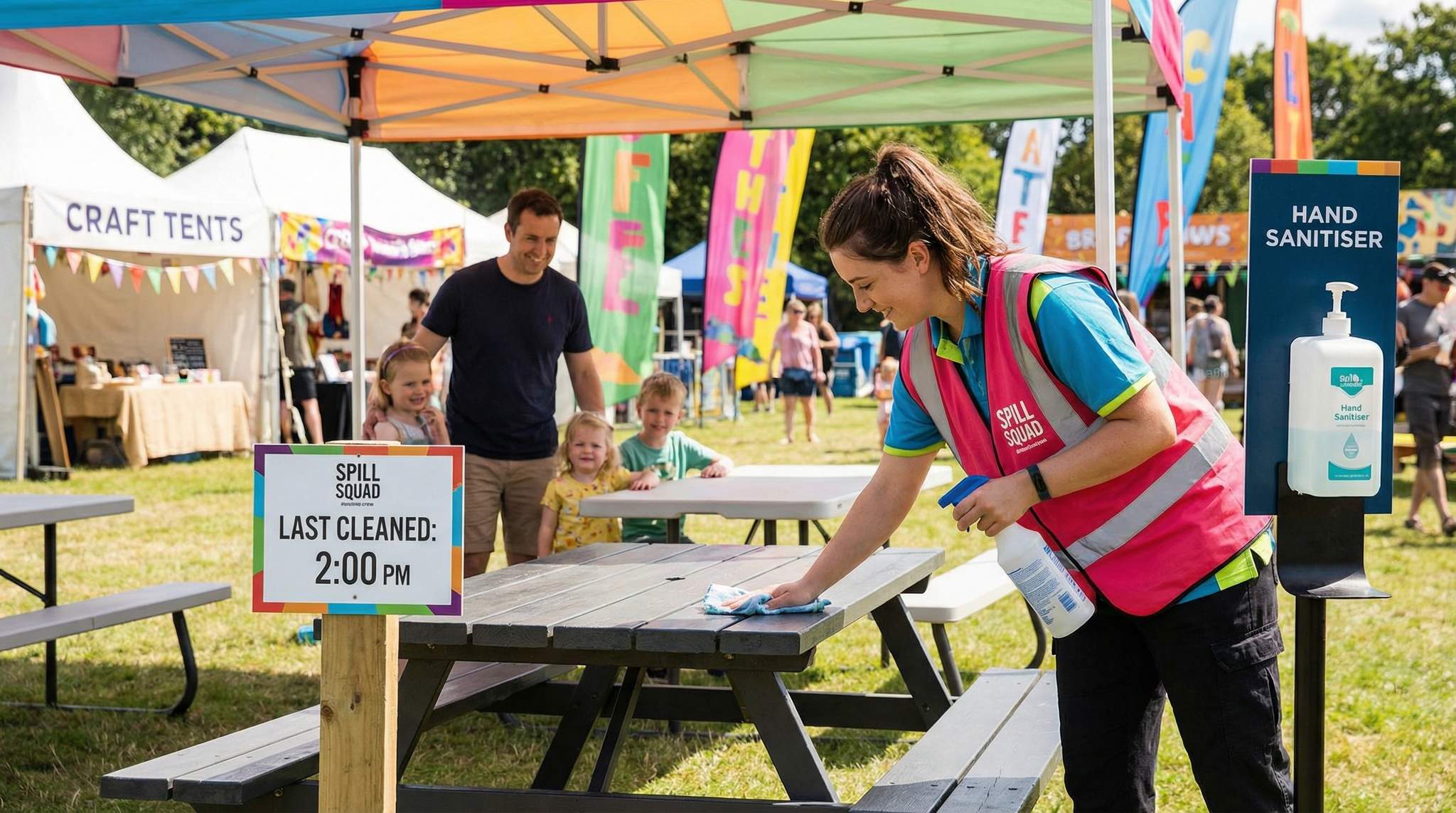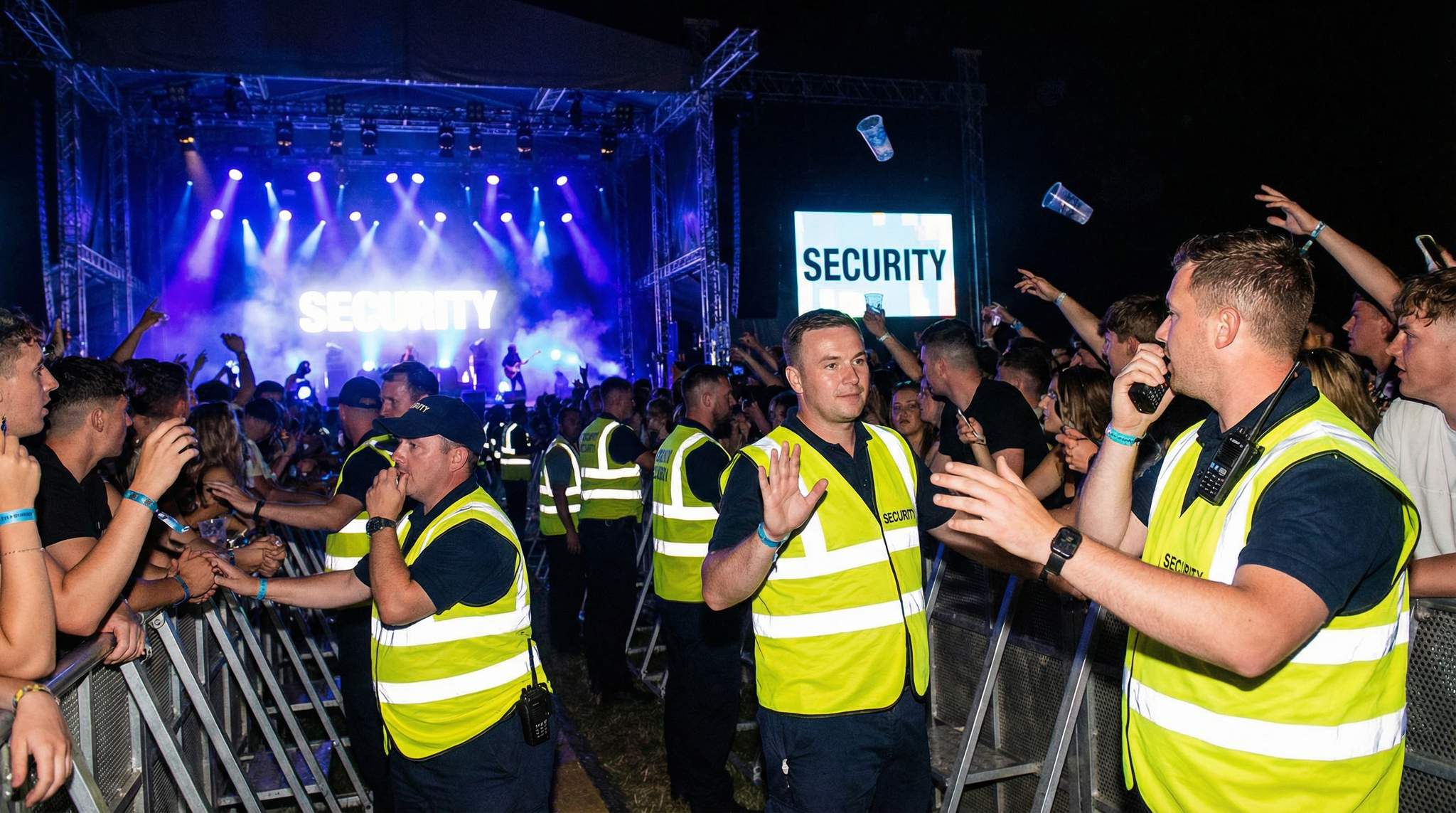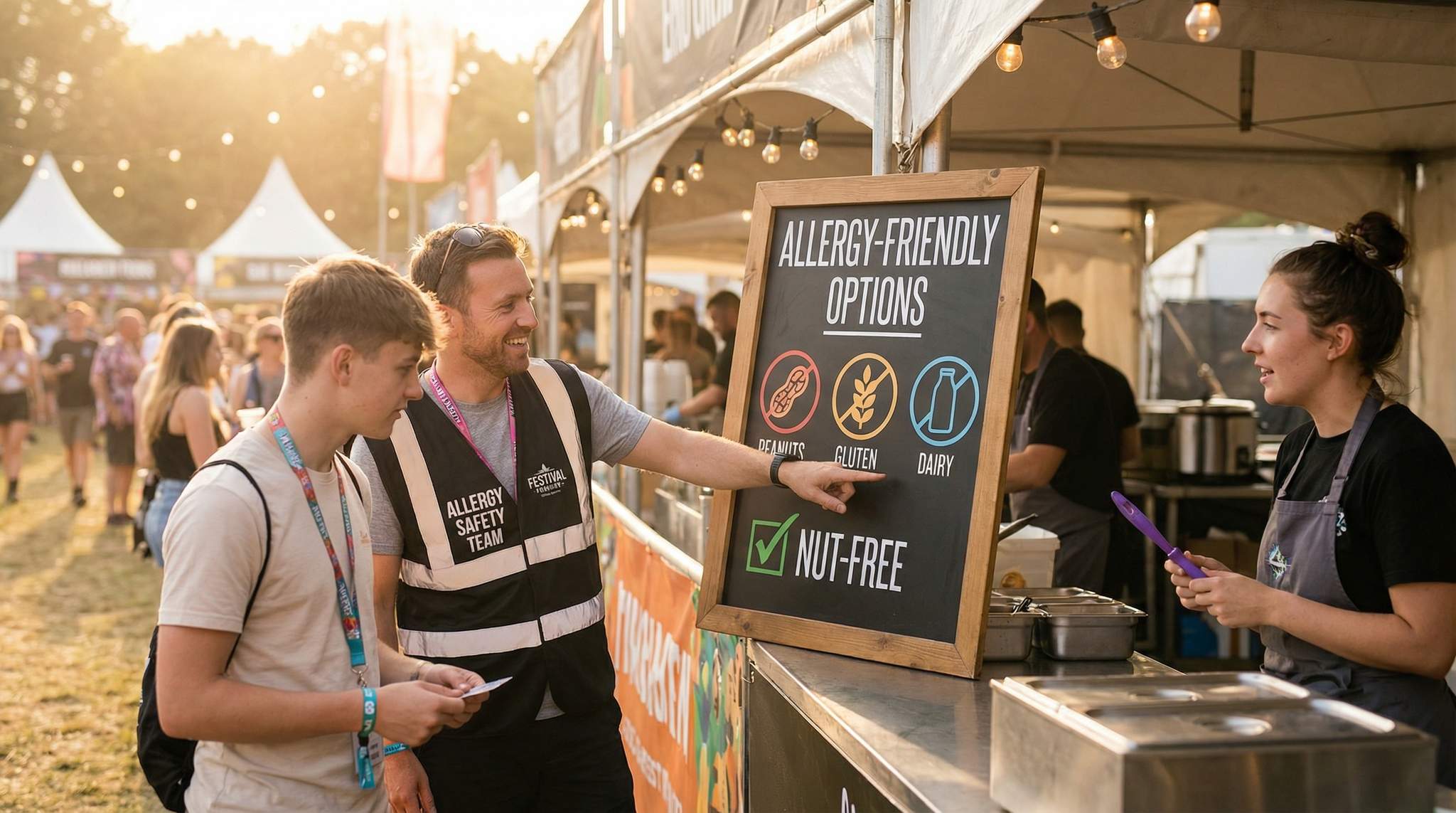Family-friendly festivals thrive on creating a safe, welcoming atmosphere for parents and children alike. A critical yet often overlooked aspect of this experience is cleanliness. Seasoned festival organisers emphasise that cleanliness isn’t just about hygiene—it’s a form of care and hospitality. When families see spotless lounges, tidy craft tables, and clean food areas, they feel valued and comfortable. This article shares veteran insights on maintaining an impeccable cleaning cadence in family zones, ensuring little ones can play and parents can relax without worry.
Focus on High-Traffic Family Areas
Certain spots in family zones generate more mess and need extra attention. Increasing cleaning frequency in these key areas can dramatically improve the overall experience:
- Family Lounges & Rest Areas: These are sanctuaries for parents with strollers and tired toddlers. Keep lounge floors and seating crumb-free and spill-free by scheduling frequent sweeps. If your festival provides comfy bean bags or cushions, shake out and wipe them down regularly. A clean lounge helps frazzled parents recharge and shows you care about their comfort. For example, at Camp Bestival in the UK (a top family-focused festival), staff are often seen tidying the Upper Kids’ Garden rest areas throughout the day, ensuring families always find a neat place to unwind.
- Kids’ Craft and Play Stations: Arts and crafts can get messy – think paint splatters, glitter spills, and sticky glue on tables. Assign dedicated cleaners to hover near craft tents during workshop sessions. As soon as one activity ends, do a quick reset: wipe tables, pick up dropped art supplies, and mop any spills before the next group arrives. Some festivals even lay down large washable mats or tarps under craft tables to catch the mess, making turnaround cleaning faster. A real-world example: At the Just So Festival in Cheshire (UK), organisers cover craft areas with tarp and have volunteers ready with brooms and wipes as kids finish each activity, so the next children come to a clean slate.
- Family Food Courts and Eating Areas: Wherever kids and food mix, expect spills. Ice cream drips, juice box explosions, and scattered french fries are par for the course. Station cleaning staff in the family dining area during all meal times. They can subtly circulate wiping tables, clearing trash, and quickly mopping up any slippery spots. This not only prevents ant and wasp infestations (a common hazard if food waste lingers) but also avoids slip-and-fall accidents on slick floors. Take a cue from major theme parks – at Disneyland, it’s said that a dropped popcorn doesn’t last more than a few minutes on the ground before a friendly cleaner sweeps in. Festivals can adopt this philosophy: swift cleaning actions show parents that the event puts safety first.
Establish a Reliable Cleaning Cadence
A cleaning cadence means setting a consistent schedule and rhythm for cleaning tasks. In family zones, the cadence will likely need to be faster than in general festival areas. Here’s how experienced festival producers manage it:
- Schedule Frequent Rounds: Plan for hourly (or even more frequent) cleaning loops through family areas. High-traffic times (like lunchtime or right after a big kids’ show) might require multiple cleaners on duty. For smaller community festivals, this could mean a volunteer does a sweep every 30 minutes, whereas large festivals might have a professional crew constantly roaming. The key is that messes never get a chance to build up.
- Adjust to the Festival’s Rhythm: Tie your cleaning schedule to the event schedule. For instance, if a craft workshop ends at 2 PM, have the cleaning team arrive at 1:55 PM ready to tidy as soon as participants disperse. If storytime in the lounge is every morning at 10 AM, schedule a cleaning patrol at 10:30 right after the crowd moves on. By syncing with programming, you ensure cleanliness is restored exactly when and where it’s needed.
- Communicate and Coordinate: Equip your cleaning crew with radios or a messaging app to call in backup for big messes. A spilled tray of food can be handled quicker when the team communicates and dispatches the nearest “spill squad” member (more on spill squads below). Clear communication prevents any single area from being neglected during a busy period. Many large events also appoint a Cleaning Coordinator for family zones – a point person who ensures the cadence is maintained and who can redeploy staff dynamically if one spot gets hectic.
- Document the Plan: Before the festival, create a cleaning rota (schedule) just like you would for stage crew or security. This should detail who cleans what area, at what times. Share this with your team during pre-festival briefings so everyone understands the heightened importance of sticking to the timetable in family areas.
Post Visible “Last Cleaned” Markers
Transparency in cleaning can greatly boost parents’ peace of mind. Visible “last cleaned” signs or time-stamped checklists reassure families that sanitation is a priority and also hold festival staff accountable.
- Use Time-Stamped Signage: Place small whiteboards or laminated signs in key spots (like at the entrance of the family lounge or next to diaper-changing stations). Every time staff clean the area, they update the sign with the time and their initials. Seeing “Last cleaned at 14:00 by Ana” tells parents that someone was there recently and invites confidence. This practice is common in public restrooms for a reason – it works.
- Apply it to Various Zones: You can post these markers in restrooms, baby changing areas, and even on craft tables (“Table sanitised at 3:30 PM”). In food courts, a board at the clearing station could list the times of the last floor sweep and trash bin emptying. Such visible accountability often gently encourages guests to keep things tidy too – knowing that staff are working hard might deter a parent from leaving that smoothie spill unattended or at least prompt them to inform staff promptly.
- Digital Displays or Apps: Some modern events use technology for this. A tablet display at the family info booth could scroll real-time cleaning updates, or a festival app might send notifications: “Family Zone tables sanitised at 1:00 PM – enjoy!”. However, a simple clipboard and pen can be just as effective in an outdoor setting. The goal is for parents to actively notice that cleaning is happening frequently.
Deploy “Spill Squads” with Smiles
Even with a great schedule, accidents will happen – a toppled soda, a crafty kid who knocked over glitter, or a sudden rain turning an area muddy. Enter the “spill squad”: a dedicated rapid-response team that jumps on messes with efficiency and positivity.
- Dedicated Rapid Responders: Identify a few staff or volunteers whose main role is to be on-call cleaners for the family zone. Arm them with cleaning kits (mops, paper towels, disinfectant spray, trash bags, extra wipes) and perhaps even a distinctive uniform or badge that says “Spill Squad”. When anyone spots a mess or gets a radio call, this team swoops in within minutes to tackle the issue. Speed is key – the faster a spill or sticky mess is cleaned, the less likely it spreads or causes accidents.
- Friendly and Non-Judgmental: Train spill squad members to be especially friendly and reassuring. Kids (and parents) can feel bad about making a mess. A smiling squad member who says “No worries at all – we’ve got this!” while quickly cleaning up a dropped plate makes families feel at ease. The tone they set can even turn an embarrassing moment into one of relief or a bit of fun. Some festivals take this to heart – reports from family areas at Burning Man (USA) note that volunteers there often handle accidents with a cheerful attitude, treating spills as “no big deal” so parents and children stay stress-free.
- Strategic Positioning: Station spill squad members where they can see or hear when something happens – near food stalls or at craft corners – but not hovering so close as to make families self-conscious. Because they roam, they can also serve as extra eyes, spotting overflowing bins or a child dropping a juice box, and addressing it on the spot.
- Celebrate the Helpers: Consider giving your cleaning crew and spill squad some public recognition. A simple shout-out in the festival program or a fun badge (“Cleaning Hero”) can boost morale. When staff take pride in keeping the festival tidy, it shows. As one festival cleaning business CEO noted, “People forget that there’s a big operation after the fun is over.” In fact, companies like Ireland’s Ryans Cleaning have built multi-million Euro businesses around festival clean-up, servicing major events like Electric Picnic and Creamfields, as highlighted in reports on family businesses in the festival circuit. That level of investment underlines how essential these behind-the-scenes heroes are to an event’s success.
Stock Up on Tissues, Wipes, and Sanitiser Stations
Parents of young kids will tell you – you can never have too many wipes or tissues handy. A truly family-friendly festival anticipates these needs. Generously stocking and distributing hygiene supplies throughout the family zone keeps everyone comfortable and healthy.
Planning a Festival?
Ticket Fairy's festival ticketing platform handles multi-day passes, RFID wristbands, and complex festival operations.
- Free Tissue & Wipe Stations: Set up small dispensers or baskets of tissues and baby wipes at convenient spots: craft tables, info booths, near portable toilets, and feeding areas. When a juice spill or runny nose happens, parents can grab a wipe immediately. Some festivals partner with sponsors (e.g., a baby care brand) to provide free wipes packets or travel-size tissue packs to families upon entry. It’s a simple gesture that goes a long way – a parent dealing with sticky fingers will deeply appreciate that readily available wipe.
- Hand Sanitiser Everywhere: Family zones should be dotted with hand sanitiser stations. Kids are touching everything – petting zoo animals, art supplies, playground equipment – so easy-access sanitiser helps prevent germ spread (especially important in a post-pandemic world). Make the dispensers fun or at least very visible: bright colours, or signage like “High-five the hygiene station!” encourages kids to use them. For instance, the Singapore Zoo’s Rainforest Lumina night festival had kid-height sanitiser dispensers shaped like friendly animals, which encouraged children to sanitise hands as a playful habit.
- Restroom and Changing Area Supplies: Keep restrooms stocked not just with toilet paper, but also with child-friendly soap (gentle on skin) and paper towels. At baby changing stations, provide sanitiser and a bin for used diapers that is emptied frequently. If you can manage it, having free diaper samples available or a stack of disposable changing mats is a luxury touch that parents will rave about.
- Regular Refill Routines: Just like cleaning, assign staff to check and refill these supplies often. A sanitiser station that’s run dry or an empty tissue box defeats the purpose. During your peak hours, have someone do a “sanitiser & supplies sweep” every 60-90 minutes. It’s part of the overall cadence: cleanliness also means having the tools for personal hygiene at everyone’s fingertips.
Cleanliness is Care: The Impact on Families
All these efforts contribute to a singular goal: showing families that clean feels like care. When festival-goers see an attentive cleaning routine, they subconsciously feel safer and more relaxed. Here’s why a clean family zone makes such a difference:
- Health and Safety: Especially with young children whose immune systems are still developing, a hygienic environment lowers the risk of illness spreading. Fewer germs on surfaces and promptly cleaned spills means less chance of stomach bugs or other infections. Safety is improved too – no one wants a toddler slipping on a puddle of soda. A well-cleaned area prevents those accidents.
- Parental Peace of Mind: Parents already juggle a lot at festivals (keeping track of kids, schedules, gear). If they don’t have to worry about dirty tables or finding a wipe when needed, that’s a huge relief. They can focus on enjoying the music or the puppet show with their child. The festival experience becomes more stress-free. Many veteran festival-goers recall experiences where a clean, well-maintained family zone allowed them to truly relax. Conversely, if they encounter sticky chaos, they’re likely to leave early or think twice about coming back next year.
- Reputation and Community Trust: Word spreads fast in parent communities. A mom in Mexico City or a dad in Melbourne will eagerly tell friends if a particular festival was impressively clean and family-oriented. That reputation builds loyalty and can even be a selling point in marketing. Consider how Fuji Rock Festival in Japan gained international fame for being exceptionally clean – attendees note that it’s possibly the cleanest festival in the world, with a strict zero-waste and no-litter policy. Family attendees at Fuji Rock benefit from this culture; they can let their kids roam without worry because the environment is so well kept. While not every event can match Japanese standards of cleanliness, striving for a cleaner festival sets you apart as a caring, world-class event.
- Community Engagement: Involving the community in cleaning efforts can also foster a spirit of care. Some festivals organise volunteer “green teams” or partner with local charities for cleanup. For example, at Glastonbury Festival (UK), dozens of volunteers team up each morning to pick up litter, leaving the grounds looking fresh each day. This initiative allows volunteers to raise funds for disadvantaged children while simultaneously boosting team morale and fueling the festival spirit. Families seeing volunteers cheerfully cleaning up get the message that everyone—organisers, staff, volunteers, and attendees—cares about the space and each other. You can create mini versions of this in your family zone: perhaps a short “cleanup song” or game at the end of a kids’ activity where children help tidy up safely (nothing heavy or dangerous, of course). It engages kids in the process and teaches them about respect for shared spaces.
Case Studies: Successes and Lessons
Consider a couple of real-world examples where cleaning in family zones made a notable impact, and some cautionary tales that highlight the importance of these practices:
- Success – Camp Bestival, UK: Camp Bestival has a reputation as a family-festival paradise, and meticulous cleanliness is part of that success. The festival provides abundant trash and recycling bins decorated in kid-friendly designs throughout their Upper Kids’ Garden and family camping areas. They deploy cleaning crews overnight and early each morning so that when families wake up, the grounds are clean, and the day starts fresh. Parents have praised how even the soft play tent (for under-fives, filled with ball pits and toys) is kept surprisingly clean despite hundreds of children using it daily. This attention to detail in cleaning and maintenance earned Camp Bestival positive reviews and many repeat family attendees.
- Success – Electric Daisy Carnival (EDC) Orlando, USA: Although EDC is known as an adult EDM festival, in 2021 they introduced a daytime Family Day event where festival organisers invited staff and local families to experience the site in a kid-friendly manner. They set up a family zone with crafts and games. Anticipating lots of little ones, EDC’s team had “cleanup fairies” (volunteers in bright outfits) roaming the area, constantly picking up trash and sanitising surfaces. The result was a pristine play space—so much so that one parent commented it was “cleaner than some public playgrounds.” The success of that approach demonstrated to EDC organisers that cleanliness is key to any family-oriented programming.
- Lesson – Overlooking the Little Things: A midsize food festival in India tried adding a children’s zone for the first time but learned a hard lesson when they didn’t increase the cleaning support accordingly. The craft tables ran out of wipes and trash bins overflowed by afternoon. Parents noticed the neglect – some stepping in to clean messes themselves – and feedback reflected their disappointment. Festival management took this as a lesson: the next year they tripled the cleaning staff for the kids’ area, added supply stations, and prominently displayed cleaning schedules. The difference in attendee satisfaction was huge; reviews went from critiques about messiness to praises of how family-friendly and clean the event had become.
- Lesson – Health and PR Risks: Neglecting cleanliness can even lead to health scares or PR nightmares. The infamous Woodstock ’99 festival (while not family-friendly and a very different event) is a stark example of how bad it can get. There, overflowing toilets and lack of sanitation contributed to an atmosphere of frustration and eventual chaos. The takeaway for any festival – big or small – is that cleanliness and adequate facilities are foundational. They prevent not just inconvenience, but also potential illness outbreaks and safety incidents. It’s far better to invest in cleaning and avoid ever having your festival mentioned as an example of poor hygiene.
Key Takeaways
- Cleanliness is Caring: Keeping family zones impeccably clean shows families you value their well-being and comfort. It’s a tangible form of hospitality that builds trust.
- High-Frequency Cleaning: Increase cleaning rounds in high-traffic family areas (lounges, craft stations, food courts). Don’t let messes linger – frequent small cleanups prevent big problems.
- Visible Accountability: Use “last cleaned” markers or logs so parents see that cleaning is ongoing. Transparency in cleanliness reassures guests and keeps staff accountable to a schedule.
- Friendly Spill Response: Train a dedicated spill squad to react quickly and kindly to accidents. A swift, smiley cleanup crew turns mishaps into positive interactions and keeps areas safe.
- Ample Supplies: Provide plenty of tissues, wipes, and sanitiser. Stock these supplies generously and refill often so that parents and kids always have what they need to stay clean.
- Plan and Train: Have a clear cleaning schedule and ensure your team (or volunteers) understands the cadence. Train them in both cleaning techniques and customer service to families.
- Learn and Adapt: Look at festivals known for cleanliness (from Fuji Rock’s zero-litter policy to Camp Bestival’s tidy play areas) and learn from less successful attempts. Continuously gather feedback from parents and adjust your cleaning strategy each year.
- Holistic Experience: Remember that for families, a clean environment is as important as great entertainment. A sparkling clean festival family zone will leave as strong an impression as the headlining act – and it keeps everyone healthier and happier.
By weaving diligent cleaning into your festival’s operations, especially in family areas, you send a powerful message: everyone is cared for here. That feeling of care will shine through in your festival’s reputation and the smiles of the families who return year after year.





